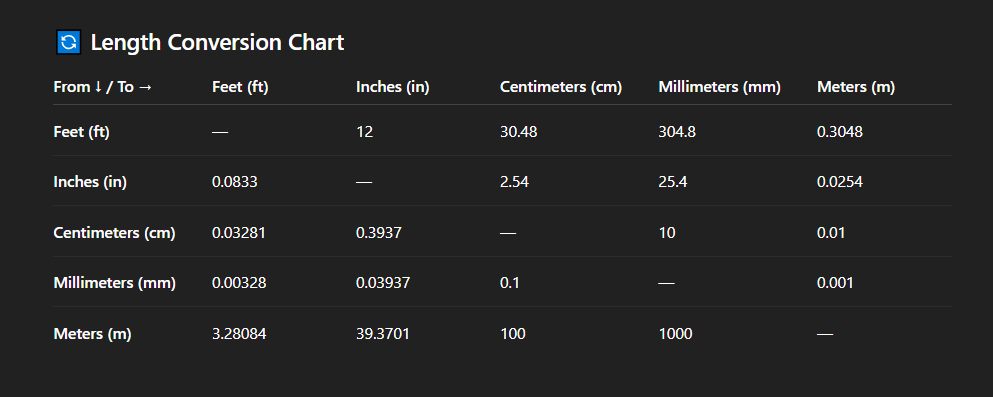Length Unit Converter
Results
1 feet is equal to
Have you ever measured a window space in feet only to find your new frame is listed in centimeters? 🤯 Or tried converting inches to millimeters while planning a custom kitchen cabinet?
These small details can create big headaches especially in house construction, where precision is everything.
Looking to convert measurements quickly and accurately? Our free online length unit converter calculator is the perfect tool to help you switch between feet, inches, centimeters, millimeters, and meters with ease.
Whether you are working on home improvements, ordering materials online, or dealing with international specifications, having a reliable unit converter at your fingertips can save time, effort, and costly mistakes.
In this unit length conversion guide, you will find how to convert between:
- Feet (ft)
- Inches (in)
- Centimeters (cm)
- Millimeters (mm)
- Meters (m)
✅ And not just in one direction this guide will help you convert both to and from each unit.
So, if you are searching for a quick way to switch between feet and inches, inches and mm, or even meters and centimeters, you are in the right place. Let’s simplify those measurements and make conversions effortless! 📏 🔁

What is Length?
In simple term length is the measurement of distance between two points.
Whether you are measuring the height of a door, the width of a room, or the distance between two cities, you are dealing with length.
It is one of the most basic and essential measurements in everyday life, construction, engineering, science, and beyond.
Why Different Units?
Ever wondered why some people measure in feet and inches, while others use centimeters and meters? It all goes back to history, geography, and cultural practices. For example:
- The imperial system (used primarily in the U.S.) is based on older British units of measure.
- The metric system (used in most of the world) was developed for consistency and simplicity during the French Revolution.
Both systems serve the same purpose to measure things but they use different units and scales.
Imperial System
- Imperial Units – Based on traditional British measurements
- Common units: inch (in), feet (ft)
- Less intuitive due to non-decimal structure (e.g., 1 feet = 12 inches)
Metric System
- Metric System – Based on powers of ten
- Common units: millimeter (mm), centimeter (cm), meter (m)
- Easier to scale up or down (e.g., 1 meter = 100 cm = 1000 mm)
Knowing these systems helps you understand how and why unit conversions matter, especially when switching between regions, industries, or applications. ✈️📦🔧
What is Feet?
A feet (ft) is a unit of length in the imperial system, commonly used in India, the United States and a few other countries.
Originally based on the average human foot length.
It is widely used in everyday measurements like room sizes, construction, real estate, and personal height measurements. 🏠📏
Conversions from Feet
Table for Quick Reference:
| From (Feet) | To (Unit) | Formula |
| ft | inches | 1 ft = 12 in |
| ft | centimeters | 1 ft = 30.48 cm |
| ft | millimeters | 1 ft = 304.8 mm |
| ft | meters | 1 ft = 0.3048 m |
Feet to Inches (ft to in)
Formula:
1 feet = 12 inches
So, how many inches are in a feet?
👉 Exactly 12 inches!
Example Calculation:
Convert 5 feet to inches:
5 ft × 12 = 60 inches
Feet to Centimeters (ft to cm)
Formula:
1 feet = 30.48 centimeters
Example Calculation:
Convert 6.5 feet to centimeters:
6.5 ft × 30.48 = 198.12 cm
Feet to Millimeters (ft to mm)
Formula:
1 feet = 304.8 millimeters
Example Calculation:
Convert 2 feet to millimeters:
2 ft × 304.8 = 609.6 mm
Feet to Meters (ft to m)
Formula:
1 feet = 0.3048 meters
Example Calculation:
Convert 10 feet to meters:
10 ft × 0.3048 = 3.048 m
🌐 Since meters are standard in most parts of the world, this conversion is essential for international communication and design.
What is Inch?
An inch (in) is a small unit of length in the imperial system, widely used in India, the United States, UK, and a few other countries.
Inch is historically derived from the width of a mans thumb literally a thumbs breadth. Over time, it was standardized to exactly 2.54 centimeters.
Today, inches are commonly used for screen sizes 📺, paper sizes 📄, and tool dimensions 🔧.
Conversions from Inches
Table for Quick Reference:
| From (Inches) | To (Unit) | Formula Used |
| in | feet | 1 in = 1/12 ft |
| in | centimeters | 1 in = 2.54 cm |
| in | millimeters | 1 in = 25.4 mm |
| in | meters | 1 in = 0.0254 m |
Inches to Feet (in to ft)
Formula:
1 inch = 1/12 feet (or simply divide by 12)
Example Calculation:
Convert 36 inches to feet:
36 in ÷ 12 = 3 ft
Inches to Centimeters (in to cm)
Formula:
1 inch = 2.54 centimeters
Example Calculation:
Convert 8 inches to centimeters:
8 in × 2.54 = 20.32 cm
Inches to Millimeters (in to mm)
Formula:
1 inch = 25.4 millimeters
Example Calculation:
Convert 4.5 inches to millimeters:
4.5 in × 25.4 = 114.3 mm
Inches to Meters (in to m)
Formula:
1 inch = 0.0254 meters
Example Calculation:
Convert 20 inches to meters:
20 in × 0.0254 = 0.508 m
What is a Centimeter?
A centimeter (cm) is a metric unit of length, widely used across the globe 🌍.
Especially in everyday measurements like height 📏, product dimensions 📦, and tailoring 👗.
It is part of the metric system, which is based on units of ten, making conversions simple and efficient.
Conversions from Centimeters
Quick Conversion Table:
| From (Centimeters) | To (Unit) | Formula Used |
| cm | millimeters | 1 cm = 10 mm |
| cm | meter | 1 cm = 0.01 m |
| cm | inch | 1 cm = 0.393701 in |
| cm | feet | 1 cm = 0.0328084 ft |
Centimeters to Millimeters (cm to mm)
Formula:
1 centimeter = 10 millimeters
Example Calculation:
Convert 15 cm to mm:
15 cm × 10 = 150 mm
Centimeters to Meters (cm to m)
Formula:
1 centimeter = 0.01 meters
Example Calculation:
Convert 250 cm to meters:
250 cm × 0.01 = 2.5 m
Centimeters to Inches (cm to in)
Formula:
1 centimeter = 0.393701 inches (or divide by 2.54)
Example Calculation:
Convert 50 cm to inches:
50 cm × 0.393701 = 19.685 in
🤓 So if you’re wondering how many inches in a centimeter? Just remember less than half an inch (0.3937).
Centimeters to Feet (cm to ft)
Formula:
1 centimeter = 0.0328084 feet (or divide by 30.48)
Example Calculation:
Convert 100 cm to feet:
100 cm × 0.0328084 = 3.28084 ft
What is a Millimeter?
A millimeter (mm) is one of the smallest commonly used units in the metric system.
It is ideal for high precision tasks like engineering, machining, or even jewelry making 💍. You will find it on rulers, calipers, and detailed technical drawings 📐.
Conversions from Millimeters
Quick Conversion Table:
| From (Millimeters) | To (Unit) | Formula Used |
| mm | centimeter | 1 mm = 0.1 cm |
| mm | meter | 1 mm = 0.001 m |
| mm | inch | 1 mm = 0.0393701 in |
| mm | feet | 1 mm = 0.00328084 ft |
Millimeters to Centimeters (mm to cm)
Formula:
1 millimeter = 0.1 centimeters
Example Calculation:
Convert 75 mm to cm:
75 mm × 0.1 = 7.5 cm
Millimeters to Meters (mm to m)
Formula:
1 millimeter = 0.001 meters
Example Calculation:
Convert 1500 mm to meters:
1500 mm × 0.001 = 1.5 m
Millimeters to Inches (mm to in)
Formula:
1 millimeter = 0.0393701 inches (or divide by 25.4)
Example Calculation:
Convert 100 mm to inches:
100 mm × 0.0393701 = 3.937 in
Millimeters to Feet (mm to ft)
Formula:
1 millimeter = 0.00328084 feet (or divide by 304.8)
Example Calculation:
Convert 500 mm to feet:
500 mm × 0.00328084 = 1.64042 ft
What is a Meter?
A meter (m) is the base unit of length in the metric system, widely used around the world 🌏.
Whether you are measuring a rooms length, tracking your daily run, or drawing up architectural plans, the meter is a universal standard that simplifies measurement across fields.
Conversions from Meters
Quick Conversion Table:
| From (Meters) | To (Unit) | Formula Used |
| m | centimeter | 1 m = 100 cm |
| m | millimeter | 1 m = 1000 mm |
| m | inch | 1 m = 39.3701 in |
| m | feet | 1 m = 3.28084 ft |
Meters to Centimeters (m to cm)
Formula:
1 meter = 100 centimeters
Example Calculation:
Convert 2.5 meters to centimeters:
2.5 m × 100 = 250 cm
Meters to Millimeters (m to mm)
Formula:
1 meter = 1000 millimeters
Example Calculation:
Convert 1.8 meters to millimeters:
1.8 m × 1000 = 1800 mm
Meters to Inches (m to in)
Formula:
1 meter = 39.3701 inches (or divide by 0.0254)
Example Calculation:
Convert 3 meters to inches:
3 m × 39.3701 = 118.11 inches
Meters to Feet (m to ft)
Formula:
1 meter = 3.28084 feet (or divide by 0.3048)
Example Calculation:
Convert 7 meters to feet:
7 m × 3.28084 = 22.96588 ft
Quick Reference Conversion Chart
When you need to convert length units fast, having a handy conversion chart is a real time saver.
Whether you are measuring for a home project 🛠️, converting data for a report 📊, or simply satisfying your curiosity, this length conversion chart gives you all the key values at a glance.
| From ↓ / To → | Feet (ft) | Inches (in) | Centimeters (cm) | Millimeters (mm) | Meters (m) |
| Feet (ft) | — | 1 ft = 12 in | 1 ft = 30.48 cm | 1 ft = 304.8 mm | 1 ft = 0.3048 m |
| Inches (in) | 1 in = 0.0833 ft | — | 1 in = 2.54 cm | 1 in = 25.4 mm | 1 in = 0.0254 m |
| Centimeters (cm) | 1 cm = 0.03281 ft | 1 cm = 0.3937 in | — | 1 cm = 10 mm | 1 cm = 0.01 m |
| Millimeters (mm) | 1 mm = 0.00328 ft | 1 mm = 0.03937 in | 1 mm = 0.1 cm | — | 1 mm = 0.001 m |
| Meters (m) | 1 m = 3.28084 ft | 1 m = 39.3701 in | 1 m = 100 cm | 1 m = 1000 mm | — |
✅ Tip: Bookmark this length conversion chart or save it as a reference for quick access during your work or study sessions.
📌 This measurement conversion chart is perfect for:
School & college projects 🧑🎓
Engineering or construction work 🏗️
Travel planning and DIY tasks ✈️🏠
Tips for Accurate Unit Conversion
While conversion formulas are straightforward, accurate conversions depend on how you use them. Whether you’re calculating measurements for a DIY project, comparing international sizes, or solving a school assignment, here are a few essential conversion tips to keep your results reliable and precise.
Understand the Context
Are you working on a school project, engineering drawing, or home design plan? Different contexts may demand different levels of precision.
Double-Check Your Formulas
One of the most common mistakes is using the wrong conversion factor.
For example:
- 1 feet = 12 inches
- 1 inch = 2.54 centimeters
Write down the formula clearly or refer to our handy conversion chart above.
Use a Calculator (📱)
When decimal values are involved, mental math often falls short.
Use a basic calculator or your phone to eliminate human error especially when converting between imperial and metric systems.
Be Mindful of Significant Figures
For scientific or engineering work, use the right number of significant figures to match the required precision.
Use Online Converters (With Caution)
Online unit converters and apps are great for quick checks. ⚠️ However, always make sure the tool you’re using is reputable and follows standardized conversion formulas (like those in our chart).
You can easily switch between different measurement units using our length unit converter calculator, perfect for quick and accurate conversions.
Need to convert land or floor measurements? Try our easy to use Area Unit Converter for accurate area conversions.
Planning a building home? Use our House Construction Cost Estimator to calculate your total budget based on size, materials, and location.
✨ Tip: Save our blog or download a printable version of the conversion chart to avoid unreliable sources.
🧠 Pro Tip: Whether you are using a manual formula or a length unit converter tool, always review your result. especially if precision is crucial.
Common Applications of Length Unit Conversion
Knowing how to convert between feet, inches, centimeters, millimeters, and meters isnt just for school or construction sites. It’s part of everyday life! Here is how practical unit conversion plays a role across different real world situations 👇
DIY & Home Improvement
Whether you are measuring for curtains, installing shelves, or planning a backyard project, precise length conversion is essential.
Example: You found a sofa listed as 200 cm, but your room measurements are in feet — converting it to 6.56 ft helps ensure a perfect fit.
Travel & International Contexts
Going abroad? Distance and size units vary across countries.
Example: Road signs in Europe use kilometers, while the US uses miles and feet.
You may also see clothing sizes and package dimensions in cm or inches. Knowing real world measurement conversions avoids confusion and costly mistakes.
Science & Engineering
In laboratories, research centers, or fieldwork, precision is key.
Engineers frequently switch between millimeters, centimeters, and meters.
Scientists use standard metric units for consistency in data and global communication.
Even a 0.01 m miscalculation could throw off an entire experiment!
Fashion & Textiles
Length conversion is a part of everyday work for designers, tailors, and textile buyers.
Fabric might be sold by the meter, while your pattern is in inches.
Shoe sizes and garment lengths may also vary depending on country. knowing conversions can save you from costly returns or redesigns.
This comprehensive guide to length unit conversion covers all key units: feet, inches, centimeters, millimeters, and meters.
Also explains how to convert between them with formulas and examples. It offers a quick reference table and explores real world uses.
Whether you’re calculating “ft to inches” or “cm to mm,” this guide ensures clarity and precision.







